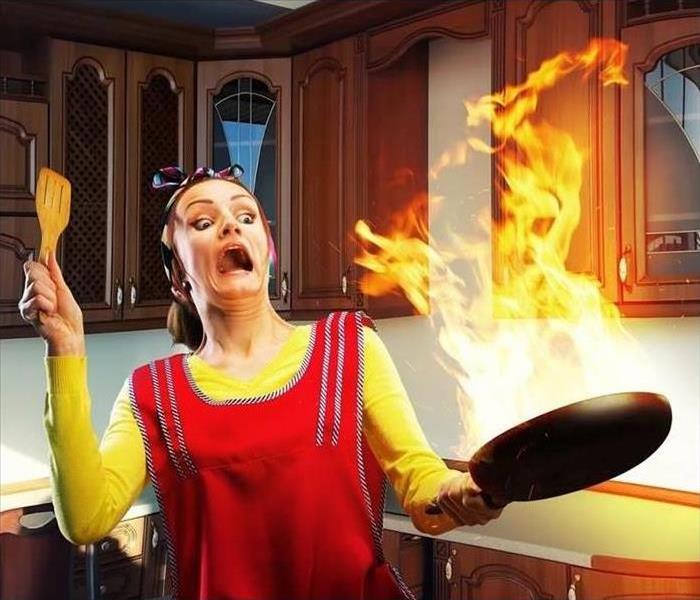Saving Items After a Kitchen Fire
11/16/2020 (Permalink)
A small house fire can lead to extensive problems. A kitchen fire, for example, contained in the area around a stove, may only burn a small area. However, the smoke smell and the soot from the fire will fill the entire room. To save money and preserve the items you love, learn what you can do in the event of a kitchen fire.
Clean Recipe Books
Modern cooks often find their recipes online, but many homes still have treasured family recipe books and paper recipes handwritten by relatives. The books have the sentimentality of an heirloom item, and homeowners may feel their loss will take away the personality of their kitchen.
Clean books carefully by using a cloth dampened with a mild detergent and water to wipe down solid covers. A dry sponge wiped along the ends of the pages can help to remove soot along the edges. Clean the exteriors as much as possible before opening the book because it is possible to spread soot-covered fingerprints across the pages.
Place any books with water damage from fire sprinklers on a table in a well-ventilated room. Open to the first damp page and keep a fan blowing across the book until the page dries. Do each page of the books individually and thoroughly to prevent mold growth from damp pages.
Some services offer ozone chambers that remove the soot and smoke smell. The process can often return the book to its pre-fire condition. Some insurance plans may cover the cost of this restoration service for valuable or irreplaceable books.
Clean Soft Materials
Curtains and kitchen towels absorb smoke odors easily, and a few trips through a washing machine do not always remove the smell or the soot. A soak overnight in a washing machine with baking powder and detergent may remove the offensive odor and soot for mild-to-moderate fabric damage. More severe damage may require professional restoration help.
Wash the Dishes
Clean all dishes thoroughly to make them shine again and to remove the toxins in the soot. Start by wiping away as much soot as possible. A dry-cleaning sponge can remove dirt and soot with no water. The sponges sell at art supply stores, home repair stores, and through online retailers.
Soak the dishes for 30 minutes or more in a pan of hot, soapy water after wiping thoroughly with the dry sponge. Use a good-quality detergent that cuts through grease. Replace the water and soap after soaking and wash the surfaces thoroughly. Towel dry the dishes and check for any odor. Repeat the process for dishes that still smell like smoke.
Sort the Groceries
Throw out any food that was open or may have had contact with water or soot. Only the food in sealed containers made from a non-porous material like glass, plastic, and metal are safe after a fire. Throw out the food in the refrigerator if the power was out for over four hours and clear the freezer if the refrigerator was off for 48 hours or more.
Do not keep any open or uncovered food like potatoes in a bin or the items in a fruit bowl. Throw away any food product close to the heat of the fire. Containers that heated too much may look acceptable from the outside, but the products inside may have cooked fully or partially in the jar.
As a homeowner you may have a lot of questions after a fire takes place. Everyone wants to preserve as many of their belongings as possible. At SERVPRO of Eaton County, Clinton and Gratiot Counties, Lansing & Holt, we can offer advice and help to clean and restore your home and belongings.
Contact us to learn more about the cleanup and restoration services we offer or call any time 24/7/365 for our emergency services.



 24/7 Emergency Service
24/7 Emergency Service
